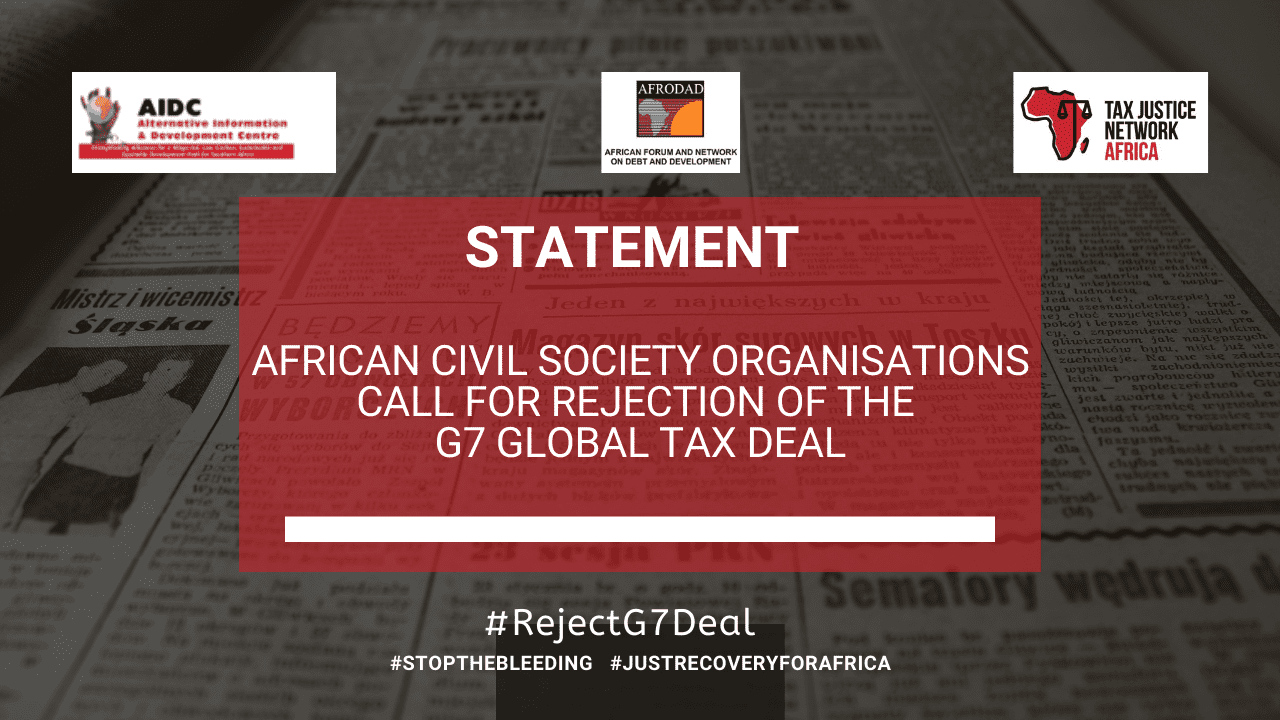Date

To endorse this statement, sign here
Progressive movements, especially in the Global South, have for decades called for an end to the power and impunity enjoyed by tax-dodging transnational corporations dominating developing economies. For African countries, the situation is especially dire as the total losses amount to billions of dollars in lost revenue with institutions such as UNCTAD pegging Africa’s capital flight at USD89 billion. This has led not only to insufficient spending on essential public services, which the COVID-19 pandemic has exposed, but also added to the continent’s unsustainable debt burden, the servicing of which has already begun to eclipse healthcare or education budgets in some countries.
Following the United States’s endorsement of stronger regulations and taxes on multinational corporations, the 4 June meeting of G7 finance ministers was therefore surrounded by an atmosphere of media optimism. Could the Covid-19 crisis have pushed even the biggest cheerleaders of unfettered globalisation to action?
The conclusion of the G7 meeting has once again proved that the developing world is on its own. In their concluding communiqué, the G7 announced their commitment to implementing the OECD’s widely criticised two-pillar proposal for the taxation of multinationals: Pillar One provides an allocation of taxing rights for “market countries” where multinationals operate, and Pillar Two institutes a global minimum corporate tax rate of 15%. The proposed minimum tax has implications on debt service for many African countries who are in the orange and red list of debt sustainability.
The G7’s unilateral commitment to these proposals has been met with severe criticism from tax justice organisations including the Global Alliance for Tax Justice.
As organisations advocating for social, economic and environmental justice in African states deeply impacted by corporate tax abuse, we, the undersigned, echo the widespread critique of the G7’s commitments on the following grounds:
- The level of commitment is completely inadequate in meeting the challenges of post-Covid 19 recovery efforts. Pillar One’s taxation of multinationals in “market countries” (where sales are made) has been subject to concession after concession. It has been watered down to the point that only a handful of companies would be eligible for a tax which would only apply to a small portion of their profits. In addition, Pillar Two’s global minimum tax rate of 15% is absurd given the ongoing global economic, health, and climate crisis – during which many multinationals have only grown their wealth.
- The proposed allocation of tax revenues is to the exclusive benefit of wealthy countries. Under the G7’s proposal, the tax revenue accruing under Pillar Two’s global minimum tax rate would be allocated to the countries in which multinationals are headquartered. Conveniently, these tend to be the finance capitals of the Global North which constitute most of the G7. The developing countries from which these profits are often extracted in the first place, and which are the most in need of fiscal resources to finance development and public services, are left by the wayside.
- The G7’s actions undermine the call for democratic reform of the global tax system through the establishment of a UN tax body . As global support for an overhaul of the international tax framework grows, the G7’s unilateral process represents an attempt to determine the bounds and agenda of global tax reform to their benefit. The process of global tax reform needs to be inclusive, democratic, just, and transparent. Neither the G7, the G20, nor the OECD are platforms in which the interests of developing nations, especially those from Africa can be represented on an equal basis.
- The proposed global minimum corporate tax rate of 15% will have implications on the African countries’ debt servicing. An analysis of three Sub Saharan countries showed that the proposed minimum tax will have implications on debt servicing as it will reduce the tax revenues accruing to countries. The most beneficial scenario is to use the Minimum Effective Tax Rate (METR) instead of the G7 15% proposal. The METR will enable countries to potentially collect more revenues in relation to their debts and be better positioned to offset their debt obligations.
As African organisations based in extractive economies, we must also emphasise that the impetus for just global tax reform goes beyond the need to fund essential public services or service debt. Many African economies are dominated by unaccountable multinationals which abuse the international tax system to not only avoid paying taxes, but also to avoid their obligations to meet environmental rehabilitation agreements, wage demands, and community development requirements – matters compounding the continent’s “resource curse”. The G7’s wilful ignorance of this reality is further evidence that their reforms are driven by self interest.
Despite this criticism, the G7 are now scrambling to secure endorsement for their plan from the G20. We cannot allow the G20, which includes some developing countries badly hit by corporate tax abuse such as Brazil and South Africa, to rubber stamp the agenda of a wealthy few at the expense of the Global South.
We therefore call on the non G7 members of the G20 from the Global South, and especially South Africa, to reject the G7’s proposal and instead support the call for a truly inclusive, just and democratic process of international tax reform at the United Nations wherein the interests of the African continent are taken into account.